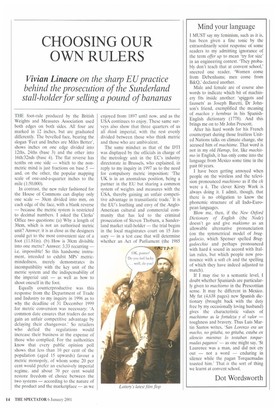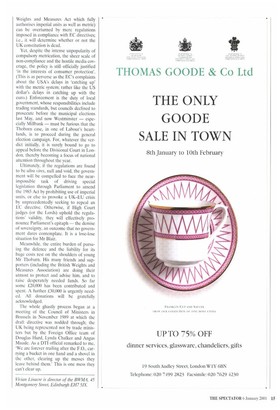CHOOSING OUR OWN RULERS
Vivian Linacre on the shalp EU practice
behind the prosecution of the Sunderland stall-holder for selling a pound of bananas
THE foot-rule produced by the British Weights and Measures Association used both edges on both sides. All four are marked in 12 inches, but are graduated differently. The bevelled face, bearing the slogan 'Feet and Inches are Miles Better', shows inches on one edge divided into 12ths, 24ths (base 3) and the other into 16th/32nds (base 4). The flat reverse has tenths on one side — which to the nonmetric mind is just fractions on base 5 — and, on the other, the popular mapping scale of one-and-a-quarter inches to the mile (1:50,000).
In contrast, the new ruler fashioned for the House of Commons can display only one scale — 30cm divided into mm, on each edge of the face, with a blank reverse — because the metric system is restricted to decimal numbers. I asked the Clerks' Office two questions: (a) Why a length of 30cm, which is not an authorised metric unit? Answer: it is as close as the designers could get to the most convenient size of a foot (11.81in). (1)) How is 30cm divisible into one metre? Answer: 3.33 recurring — i.e. impossible! So this handsome instrument, intended to exhibit MPs' metricmindedness, merely demonstrates its incompatibility with the key unit of the metric system and the indispensability of the imperial unit — as well as how to shoot oneself in the foot.
Equally counterproductive was this response from the Department of Trade and Industry to my inquiry in 1996 as to why the deadline of 31 December 1999 for metric conversion was necessary: 'A common date ensures that traders do not gain an unfair competitive advantage by delaying their changeover.' So retailers who defied the regulations would increase their business at the expense of those who complied. For the authorities know that every public opinion poll shows that less than 10 per cent of the population (aged 15 upwards) favour a metric monopoly, of whom some 20 per cent would prefer an exclusively imperial regime, and about 70 per cent would restore freedom of choice between the two systems — according to the nature of the product and the marketplace — as we enjoyed from 1897 until now, and as the USA continues to enjoy. These same surveys also show that three quarters of us all think imperial, with the rest evenly divided between those who think metric and those who are ambivalent.
The same mindset as that of the DTI was displayed by the officials in charge of the metrology unit in the EC's industry directorate in Brussels, who explained, in reply to my inquiry in 1997 as to the need for compulsory metric imposition: 'The UK is in an anomalous position, being a partner in the EU but sharing a common system of weights and measures with the USA, thereby gaining an unfair competitive advantage in transatlantic trade.' It is the EU's loathing and envy of the AngloAmerican cultural and commercial community that has led to the criminal prosecution of Steven Thoburn, a Sunderland market stall-holder — the trial begins in the local magistrates court on 15 January — in a test case that will determine whether an Act of Parliament (the 1985 Weights and Measures Act which fully authorises imperial units as well as metric) can be overturned by mere regulations imposed in compliance with EC directives; i.e., it will determine whether or not the UK constitution is dead.
Yet, despite the intense unpopularity of compulsory metrication, the sheer scale of non-compliance and the hostile media coverage, the policy is still officially justified 'in the interests of consumer protection'. (This is as perverse as the EC's complaints about the USA's delays in 'catching up' with the metric system; rather like the US dollar's delays in catching up with the euro.) Enforcement is the duty of local government, whose responsibilities include trading standards, but councils declined to prosecute before the municipal elections last May, and now Westminster — especially Millbank — must be furious that the Thoborn case, in one of Labour's heartlands, is to proceed during the general election campaign. For, whatever the verdict initially, it is surely bound to go to appeal before the Divisional Court in London, thereby becoming a focus of national attention throughout the year.
Ultimately, if the regulations are found to be ultra vires, null and void, the government will be compelled to face the nearimpossible task of driving special legislation through Parliament to amend the 1985 Act by prohibiting use of imperial units, or else to provoke a UK–EU crisis by unprecedentcdly seeking to repeal an EC directive. Otherwise, if High Court judges (or the Lords) uphold the regulations' validity, they will effectively pro nounce Parliament's epitaph the demise of sovereignty, an outcome that no government dares contemplate. It is a lose-lose situation for Mr Blair.
Meanwhile, the entire burden of pursuing the defence and the liability for its huge costs rest on the shoulders of young Mr Thoburn. His many friends and supporters (including the British Weights and Measures Association) are doing their utmost to protect and advise him, and to raise desperately needed funds. So far some 120,000 has been contributed and spent. A further .00,000 is urgently needed. All donations will be gratefully acknowledged.
The whole ghastly process began at a meeting of the Council of Ministers in Brussels in November 1989 at which the draft directive was nodded through; the UK being represented not by trade ministers but by the Foreign Office team of Douglas Hurd, Lynda Chalker and Angus Maude. As a DTI official remarked to me, 'We are forever trailing after the F.O., carrying a bucket in one hand and a shovel in the other, clearing up the messes they leave behind them.' This is one mess they can't clear up.
Vivian Linacre is director of the BWMA, 45 Montgornety Street, Edinburgh EH7 5JX



















































 Previous page
Previous page